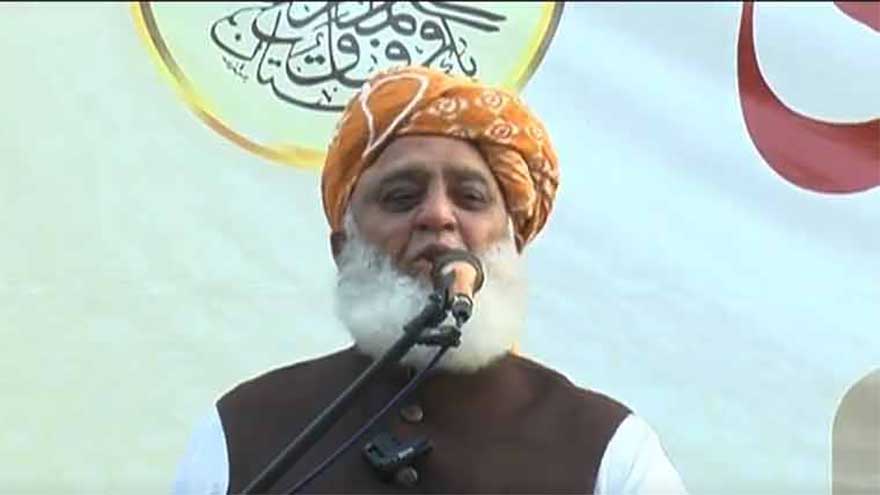Listen to the article
Religious seminaries in Pakistan face unwarranted criticism, says JUI-F leader
Jamiat Ulema-e-Islam Fazl (JUI-F) chief Maulana Fazlur Rehman has denounced what he calls a coordinated propaganda campaign against religious seminaries in Pakistan, claiming foreign interests are attempting to radicalize the country’s youth by turning them away from religious education.
Speaking at the Tahafuz Madrasah Diniya Convention in Multan on Saturday, the veteran political leader defended the role of madrasas in Pakistani society, asserting that these institutions have played a crucial role in preventing young people from being drawn toward extremism.
“External agents are worried how we saved the young generation from getting agitated,” Rehman told convention attendees. “We saved the young generation, that is why the external agenda is working against us.”
The JUI-F leader, who has been a prominent figure in Pakistan’s religious-political landscape for decades, emphasized that Islamic institutions are operating in accordance with Pakistan’s constitutional framework, which explicitly establishes Islam as the state religion.
Rehman placed the current challenges facing religious seminaries within a broader historical context, noting that scrutiny of madrasas intensified following the September 11, 2001 terrorist attacks in the United States, which led to a wave of terrorist incidents across the region and increased international attention on religious education in Pakistan.
According to Rehman, there exists a deliberate foreign-backed initiative aimed at distancing Pakistan’s youth from religious education while promoting what he described as “so-called enlightenment” – a term he used critically to suggest imposed Western values incompatible with Pakistani religious identity.
The JUI-F chief accused foreign powers of employing divisive tactics in Muslim countries, pointing to regional examples as evidence of harmful interference. “The foreign rulers tried to divide us into sects, destroyed Afghanistan, and said they came for peace,” he claimed. “They destroyed Iraq, Syria, and Palestine, and yet they say the same thing that they came for peace.”
Religious seminaries in Pakistan have long been a subject of complex debate. While they provide education to millions of children, particularly from underprivileged backgrounds, they have also faced allegations from international observers and some domestic critics regarding curriculum content and alleged links to extremist ideologies in certain institutions.
The Pakistani government has implemented various reform initiatives for madrasas over the past two decades, attempting to bring religious education more in line with mainstream schooling by incorporating additional subjects and implementing registration requirements.
Rehman’s defense comes at a time when Pakistan continues to navigate tensions between religious traditionalism and modernization efforts. The JUI-F, as one of the country’s most influential religious-political parties, has consistently advocated for the protection of religious education systems against what it perceives as unwarranted Western influence.
The Tahafuz Madrasah Diniya Convention in Multan brought together religious scholars and madrasa administrators from across the region to discuss challenges facing religious education institutions and strategies for their preservation in contemporary Pakistani society.
While Rehman’s comments reflect the perspective of religious conservatives in Pakistan, educational experts have noted that meaningful reform of religious seminaries requires balancing traditional religious instruction with the practical educational needs of students in the modern world – a balance that continues to be debated across Pakistan’s diverse political and social landscape.
Verify This Yourself
Use these professional tools to fact-check and investigate claims independently
Reverse Image Search
Check if this image has been used elsewhere or in different contexts
Ask Our AI About This Claim
Get instant answers with web-powered AI analysis
Related Fact-Checks
See what other fact-checkers have said about similar claims
Want More Verification Tools?
Access our full suite of professional disinformation monitoring and investigation tools




8 Comments
An interesting perspective on the role of religious seminaries in Pakistan. It’s important to ensure a balanced approach that respects religious institutions while also addressing any legitimate concerns about extremism.
This is a complex issue that touches on sensitive topics of religion, education, and national security. I’m curious to learn more about the specific concerns and claims being made on both sides of this debate.
The accusation of a ‘propaganda campaign’ against religious seminaries is serious. I’d be interested to see the specific evidence and arguments on both sides of this issue before forming a more definitive opinion.
The claim of a ‘coordinated propaganda campaign’ against religious seminaries is concerning. However, transparency and accountability are important, especially when it comes to the influence of religion in public life. A nuanced discussion is needed.
This is a nuanced topic that deserves a thoughtful, impartial examination. While Fazl’s defense of madrasas is understandable, concerns about extremism and accountability in the religious education sector also warrant consideration.
This seems like a complex and sensitive issue. I appreciate Fazl’s emphasis on the positive role of madrasas in preventing youth radicalization, but it’s crucial that all educational institutions operate within the bounds of the law and constitution.
Fazl’s statement highlights the important role of religious institutions in Pakistan, but also raises questions about potential external influences and the need for oversight. A balanced, evidence-based approach seems crucial.
Fazl’s defense of madrasas as safeguarding youth from extremism is thought-provoking. But the broader context of religious education and its potential links to radicalization warrant careful examination, with input from diverse stakeholders.